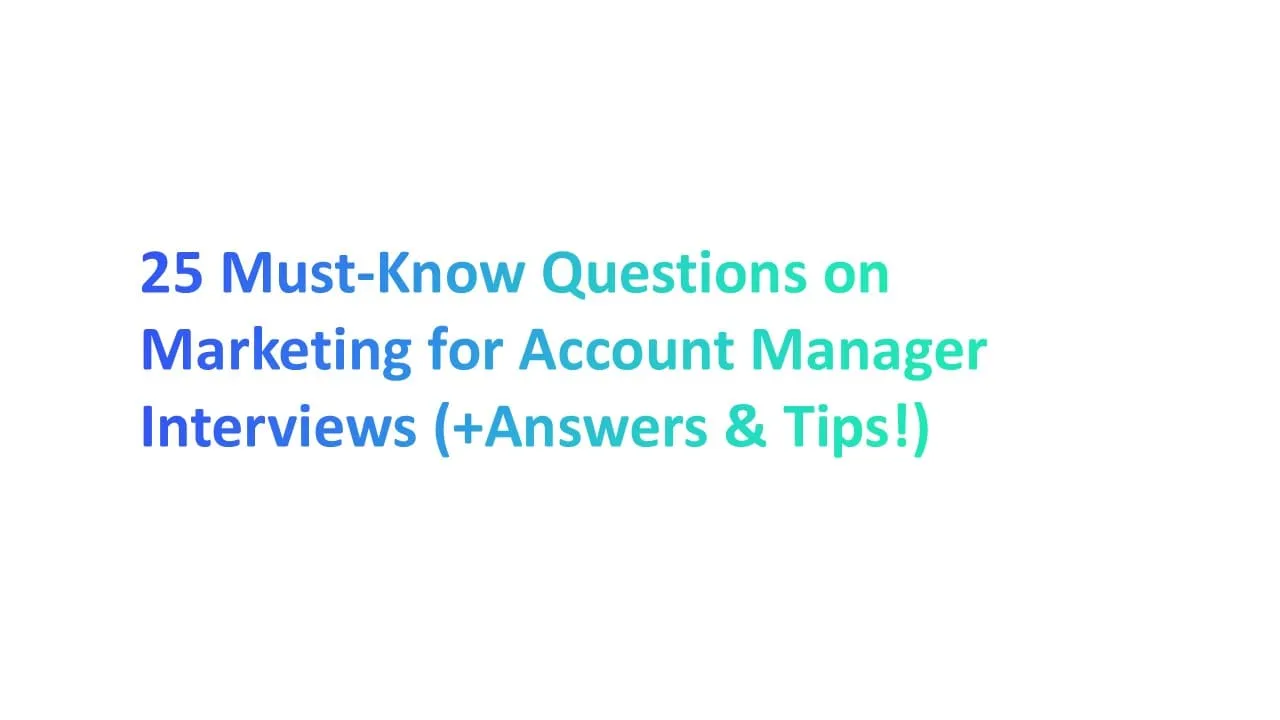Preparing for an account manager interview can be daunting, especially when anticipating questions on marketing. To help you navigate this process, we've compiled a list of 25 essential questions that often arise in these interviews, complete with answers and tips.
Did you know that only 29% of B2B customers are fully engaged with their vendors? This statistic underscores the importance of effective account management in fostering client satisfaction.
By familiarizing yourself with these questions, you'll be better equipped to demonstrate your expertise in managing multiple client accounts and addressing client feedback. Let's dive in and enhance your readiness for the account manager role.
Top 25 Questions on Marketing for Account Manager Interviews

1. What are the key responsibilities of an account manager in marketing?
Explanation: An account manager plays a central role in managing client relationships, ensuring marketing strategies align with business objectives, and overseeing multiple client accounts. They work closely with internal teams to deliver effective campaigns while handling client expectations and concerns.
Answer: A successful account manager role requires managing client needs, optimizing marketing campaigns, and ensuring client satisfaction. Strong communication skills and the ability to manage multiple accounts effectively are essential.
2. How do you develop a marketing strategy for a client?
Explanation: Every client has unique goals, requiring a tailored marketing strategy. The strategy should align with business development, industry trends, and key performance indicators (KPIs).
Answer: Start by analyzing client expectations, past clients’ performance data, and industry knowledge. Use CRM software to track key accounts and ensure a structured approach that meets revenue targets.
3. What metrics do you use to measure the success of a marketing campaign?
Explanation: Tracking the right metrics helps an account manager assess campaign performance and make necessary adjustments.
Answer: Key performance indicators include conversion rates, customer relationship management efficiency, and client feedback. Generating sales reports regularly ensures better insights into performance.
4. How do you handle multiple client accounts with different marketing needs?
Explanation: Managing multiple client accounts requires organizational skills and a clear approach to prioritizing tasks.
Answer: Use project management tools to assign priorities, maintain strong relationships through regular communication channels, and track account performance with CRM tools.
5. What are the biggest marketing challenges account managers face?
Explanation: Marketing challenges include handling client complaints, adapting to industry trends, and meeting client expectations.
Answer: A successful account manager must be proactive in addressing client concerns, use strong communication skills to resolve conflicts, and stay updated with key industry knowledge.
6. How do you align marketing efforts with a client’s business goals?
Explanation: Ensuring that marketing aligns with business growth requires a structured approach.
Answer: Understand the client's perspective, use CRM software for data-driven insights, and provide tailored solutions to achieve targeted revenue goals.
7. What marketing tools do you use to track performance and engagement?
Explanation: The right tools help in managing account management roles efficiently.
Answer: Use CRM tools, project management software, and customer relationship management platforms to monitor engagement, client interactions, and campaign performance.
8. How do you stay updated with the latest marketing trends and strategies?
Explanation: Industry knowledge is essential for refining strategies and staying competitive.
Answer: Follow key accounts in your industry, analyze sales reports, and participate in industry discussions with internal teams.
9. How do you handle a client who is unhappy with marketing results?
Explanation: Managing client dissatisfaction requires conflict resolution skills and a proactive approach.
Answer: Listen actively, provide constructive feedback, and offer tailored solutions that align with their expectations.
10. How do you approach competitor analysis in marketing?
Explanation: Understanding competitors helps refine marketing strategies and attract new and existing clients.
Answer: Use market research, sales reports, and CRM software to compare key performance indicators and refine strategies.
11. What role does data play in your marketing decision-making process?
Explanation: Data-driven decision-making helps optimize marketing strategies and client management.
Answer: Track revenue targets, manage multiple accounts, and use CRM software for better forecasting and reporting.
12. How do you prioritize tasks when managing multiple marketing campaigns?
Explanation: Prioritizing tasks effectively helps in maintaining strong client relationships.
Answer: Use project management tools, regular communication channels, and account management techniques to ensure seamless execution.
13. What are the most important KPIs for marketing success?
Explanation: Measuring performance accurately helps in business growth.
Answer: Focus on key performance indicators such as conversion rates, revenue targets, and client satisfaction scores.
14. How do you tailor marketing strategies for different industries?
Explanation: Customizing strategies ensures higher engagement and client retention.
Answer: Conduct market research, analyze past clients’ success, and use CRM tools to adjust strategies based on industry knowledge.
15. How do you collaborate with sales teams to drive better marketing outcomes?
Explanation: Marketing and sales alignment increases efficiency.
Answer: Maintain strong relationships with sales teams, provide relevant skills training, and analyze sales reports to adjust strategies.
16. What are the best ways to generate high-quality leads through marketing?
Explanation: Effective lead generation drives business development.
Answer: Leverage CRM software, track key clients, and use industry trends to optimize marketing efforts.
17. How do you create a marketing budget and allocate resources effectively?
Explanation: Budget allocation ensures optimized campaign execution.
Answer: Use CRM tools to track spending, prioritize high-performing channels, and ensure client needs are met efficiently.
18. What are the key elements of a successful content marketing strategy?
Explanation: Content marketing plays a crucial role in client engagement.
Answer: Focus on storytelling, strong communication skills, and maintaining consistent messaging across multiple clients.
19. How do you measure the ROI of a marketing campaign?
Explanation: Measuring ROI ensures the campaign's impact is understood.
Answer: Use client interactions, sales reports, and client satisfaction metrics to analyze performance.
20. How do you ensure consistent branding across multiple marketing channels?
Explanation: Consistency builds brand credibility.
Answer: Align branding guidelines across platforms, use regular communication channels, and monitor client feedback.
21. What strategies do you use for email marketing success?
Explanation: Email marketing remains a vital marketing channel.
Answer: Use CRM tools for segmentation, analyze past clients' responses, and track email performance.
22. How do you handle marketing campaigns that aren’t performing as expected?
Explanation: Addressing underperforming campaigns quickly is critical.
Answer: Review key accounts, adjust strategies based on client concerns, and use constructive feedback for improvements.
23. How do you effectively communicate marketing results to clients?
Explanation: Clear communication ensures transparency.
Answer: Use data-driven reports, active listening, and CRM tools to present findings effectively.
24. What are the most effective social media marketing strategies for clients?
Explanation: Social media plays a vital role in engagement.
Answer: Leverage industry trends, engage clients regularly, and analyze strong relationships built through different platforms.
25. How do you manage client expectations regarding marketing timelines and results?
Explanation: Setting realistic expectations leads to higher client satisfaction.
Answer: Use client relationship management strategies, strong communication skills, and clear deliverables to ensure transparency.
How Should an Account Manager Approach Marketing?

An account manager should approach marketing with a clear understanding of client needs and a structured plan. Reviewing the job description helps in aligning strategies with expectations.
During the interview process, showcasing a candidate's ability to handle new client relationships and resolve client issues is essential. Strong interpersonal skills and negotiation skills help in managing campaigns effectively.
Regular phone calls ensure clear communication. Handling an aggressive client or customer complaints requires patience and quick resolution.
Hiring managers often look for a sample answer demonstrating how to successfully retain clients while managing priorities with time management skills and key skills.
What Makes an Account Manager Role Successful in Marketing?

A successful account manager role requires a combination of strategic thinking, strong communication, and adaptability.
The ability to build relationships, analyze data, and manage multiple clients effectively is key to long-term success.
Here’s how each aspect contributes to excelling in marketing as an account manager:
1. Strong Client Relationship Management
Building and maintaining relationships with clients is essential. Clients value consistency, trust, and clear communication.
Providing positive feedback when campaigns perform well and addressing concerns promptly can strengthen partnerships. Understanding client goals and expectations ensures that marketing efforts align with their business needs.
2. Effective Communication and Negotiation
Clear and persuasive communication helps account managers explain marketing strategies, report on progress, and manage expectations. Negotiation skills are useful when discussing budgets, campaign adjustments, or managing differing opinions.
Strong communication also helps in presenting data to clients in a way that highlights campaign success and areas for improvement.
3. Deep Understanding of Marketing Strategies
A strong grasp of marketing principles allows account managers to develop and execute effective campaigns. They should stay updated on the latest industry practices and be able to adjust strategies based on client needs and market changes.
This understanding helps in making informed decisions and guiding clients toward the best approaches.
4. Data-Driven Decision Making
Marketing success relies on data analysis and performance tracking. Account managers should use key performance indicators (KPIs) to measure campaign effectiveness.
Presenting reports with clear metrics ensures clients see the impact of marketing efforts. By analyzing trends, they can optimize strategies for better results.
5. Ability to Manage Multiple Client Accounts
Handling multiple clients requires organization and efficiency. Using structured workflows and prioritizing tasks helps in managing deadlines and expectations.
Account managers should set realistic timelines and keep clients informed about progress. Effective delegation and use of marketing tools streamline account management.
6. Collaboration with Sales and Marketing Teams
A strong connection between sales and marketing ensures consistency in messaging and campaign goals.
Account managers act as a bridge between these teams, ensuring that marketing aligns with sales efforts. Collaboration leads to better client retention and improved marketing outcomes.
7. Proactive Problem-Solving Approach
Challenges are inevitable in marketing, from shifting client demands to underperforming campaigns. A proactive approach means identifying potential problems early and implementing solutions before they escalate.
Learning from past experiences at a previous company can also help develop effective problem-solving strategies.
8. Strong Time Management and Prioritization Skills
Marketing involves juggling various projects, deadlines, and client expectations. Time management skills allow account managers to stay organized, meet deadlines, and ensure that each client receives proper attention. Prioritizing tasks based on urgency and impact improves efficiency.
9. Adaptability to Changing Market Trends
Marketing trends evolve constantly, requiring account managers to stay flexible. Adapting strategies based on consumer behavior, technology advancements, and competitive shifts ensures continued success. Being open to new approaches and testing different tactics can help optimize marketing campaigns.
10. Consistent Performance Tracking and Optimization
Regularly reviewing marketing performance allows for adjustments that improve results. Conducting account manager interview questions internally can help assess strengths and areas for development.
Reviewing interview questions and answers with team members provides insights into improving processes. Continuous learning and refinement of strategies help maintain long-term success in marketing account management.
By mastering these skills and approaches, account managers can ensure they deliver value to clients and drive successful marketing campaigns. Excellence in marketing requires not just knowledge, but also the ability to adapt, communicate, and lead effectively.
Expert Tips to Ace Your Account Manager Interview

Succeeding in an account manager interview requires preparation, confidence, and the ability to showcase relevant skills.
Employers look for candidates who understand marketing strategies, manage client expectations, and communicate effectively.
Here’s how you can prepare:
1. Research the Company’s Marketing Strategy
Understanding how the company approaches marketing helps in aligning your answers with their expectations.
- Study the company’s website, blog, and social media to learn about their campaigns.
- Review any case studies or press releases to see past marketing successes.
- Identify their target audience and how they position their brand in the market.
- Be prepared to discuss how your experience aligns with their marketing efforts.
2. Align Your Experience with the Role
Hiring managers want to see how your background matches the job description.
- Review the responsibilities listed in the job posting.
- Highlight relevant skills, such as client relationship management and communication skills.
- Use examples from past roles where you handled multiple client accounts or improved client satisfaction.
- Show how your previous company experience has prepared you for this role.
3. Use Real Marketing Success Examples
Proving your impact with real examples can make your answers more persuasive.
- Share specific marketing campaigns you worked on and their outcomes.
- Discuss a time when your strategy improved client engagement or revenue targets.
- If applicable, mention key performance indicators you used to measure success.
- Keep your answers concise and focused on results.
4. Stay Confident Under Pressure
Interviews can be stressful, but maintaining composure is key.
- Practice answering account manager interview questions with a friend or mentor.
- Take a moment before responding to difficult questions to collect your thoughts.
- Demonstrate leadership skills by confidently explaining how you solve client issues.
- Avoid filler words and keep your responses structured.
5. Prepare for Behavioral Questions
Behavioral questions assess how you handle real-world situations.
- Expect questions about handling client complaints and managing challenging relationships.
- Use the STAR method (Situation, Task, Action, Result) to structure your responses.
- Share examples of how you resolved conflicts or improved client satisfaction.
- Highlight your ability to adapt to unexpected marketing challenges.
6. Show Your Marketing Analytics Skills
Demonstrating analytical skills sets you apart from other candidates.
- Discuss how you use marketing analytics tools to track performance.
- Explain how you analyze sales reports and adjust strategies accordingly.
- Share how you have used data insights to improve client relationships.
- If applicable, provide an example of how analytics led to a campaign adjustment that benefited key clients.
7. Ask Smart Questions About the Role
The questions you ask show your interest in the company and role.
- Inquire about the company’s long-term marketing goals.
- Ask how success is measured for an account manager role in their organization.
- Clarify expectations for managing multiple client accounts.
- Show curiosity about how the company handles client feedback and improvements.
By preparing these key points, you’ll be well-equipped to leave a strong impression and demonstrate why you're the best fit for the role.
How to Handle Multiple Client Accounts in Marketing?

Managing multiple client accounts in marketing requires organization, clear communication, and strategic planning. An account manager must ensure that each client receives the attention they need while maintaining efficiency. Here’s how to handle multiple accounts effectively:
1. Setting Priorities for Each Client
Each client has different needs, budgets, and goals. Prioritizing them correctly ensures that deadlines are met and expectations are managed.
How to do it:
- Rank clients based on urgency, deadlines, and campaign impact.
- Create a task list and update it regularly.
- Allocate time wisely, ensuring high-value clients get the necessary focus.
- Use a color-coded system or project management tools to differentiate tasks.
2. Using CRM Tools for Organized Tracking
CRM tools help keep track of multiple client interactions, campaign progress, and follow-ups, ensuring no detail is overlooked.
How to do it:
- Choose a CRM system that integrates with email, calendar, and reporting tools.
- Maintain detailed client profiles, including preferences, past campaigns, and feedback.
- Set automated reminders for check-ins and reporting deadlines.
- Keep a shared internal database so that all team members can access client history.
3. Managing Deadlines Without Overlap
Handling multiple deadlines requires planning to avoid conflicts and last-minute pressure.
How to do it:
- Map out all client deadlines on a shared calendar.
- Schedule campaigns in advance to prevent last-minute overlaps.
- Assign buffer time between major client projects.
- Review deadlines weekly to ensure everything stays on track.
4. Customizing Strategies for Different Clients
Each client requires a tailored marketing strategy based on their industry, audience, and goals.
How to do it:
- Conduct regular meetings to understand each client’s evolving needs.
- Track industry trends and adjust strategies accordingly.
- Keep marketing reports unique to each client, avoiding a one-size-fits-all approach.
- Align client objectives with realistic marketing goals.
5. Ensuring Clear and Timely Communication
Clients expect regular updates on their campaigns, making communication a key factor in maintaining trust.
How to do it:
- Set a communication schedule for updates, whether weekly or biweekly.
- Use multiple channels such as emails, calls, and virtual meetings for clarity.
- Address client concerns promptly to avoid misunderstandings.
- Encourage transparency in sharing progress and potential challenges.
6. Handling Client Requests Efficiently
Clients often have urgent requests that require quick responses without affecting other projects.
How to do it:
- Categorize client requests based on priority and complexity.
- Set realistic expectations on turnaround times.
- If needed, delegate urgent tasks to team members without disrupting other commitments.
- Ensure that account manager candidates are trained in handling unexpected client needs smoothly.
By implementing these strategies, account managers can efficiently manage multiple client accounts without compromising quality. The key lies in structured planning, clear communication, and a proactive approach to problem-solving.
Conclusion
Preparing for an account manager interview requires more than just technical knowledge, it’s about understanding client relationships, handling multiple client accounts, and making data-driven decisions.
These 25 must-know questions on marketing help you anticipate what hiring managers are looking for and craft strong, confident responses. Whether it's managing client expectations, analyzing marketing performance, or demonstrating leadership skills, having clear, structured answers will set you apart.
Stay prepared, practice your responses, and approach the interview with confidence. A well-prepared account manager doesn’t just answer questions—they showcase their ability to drive marketing success.





.png)

.png)
